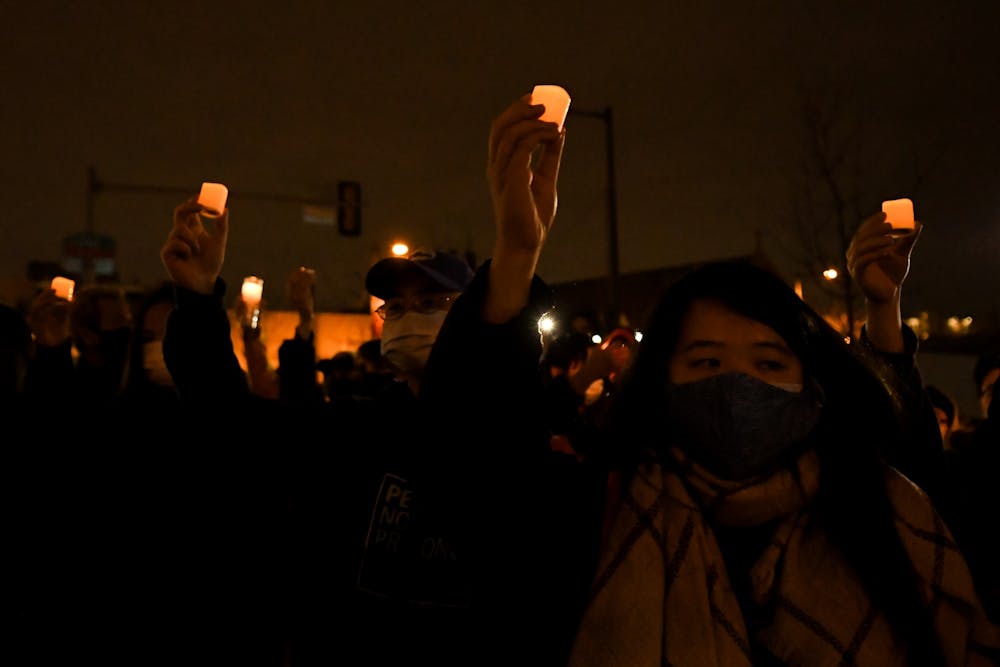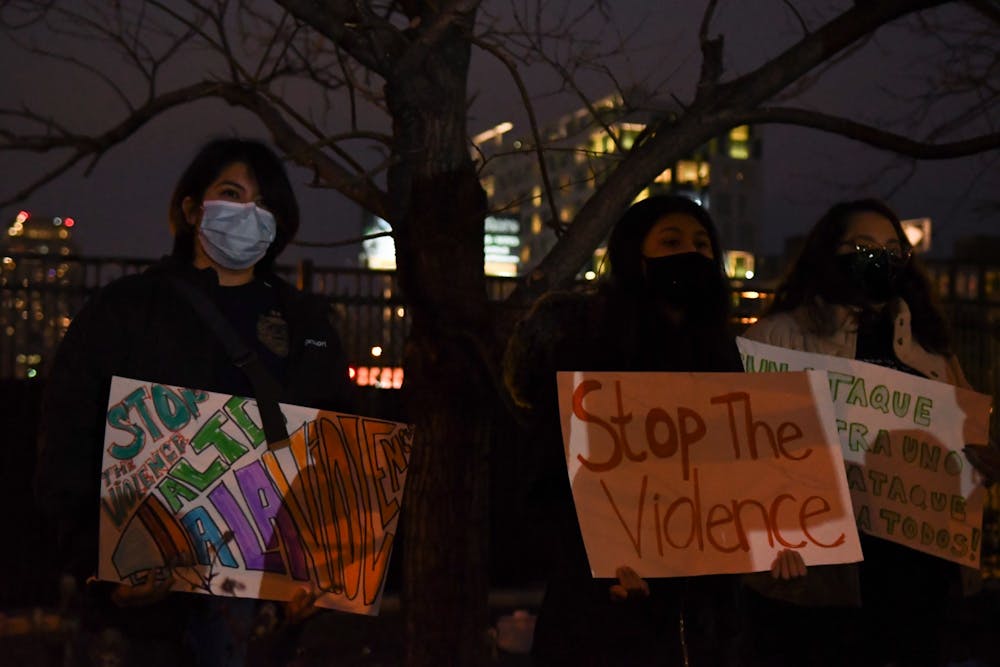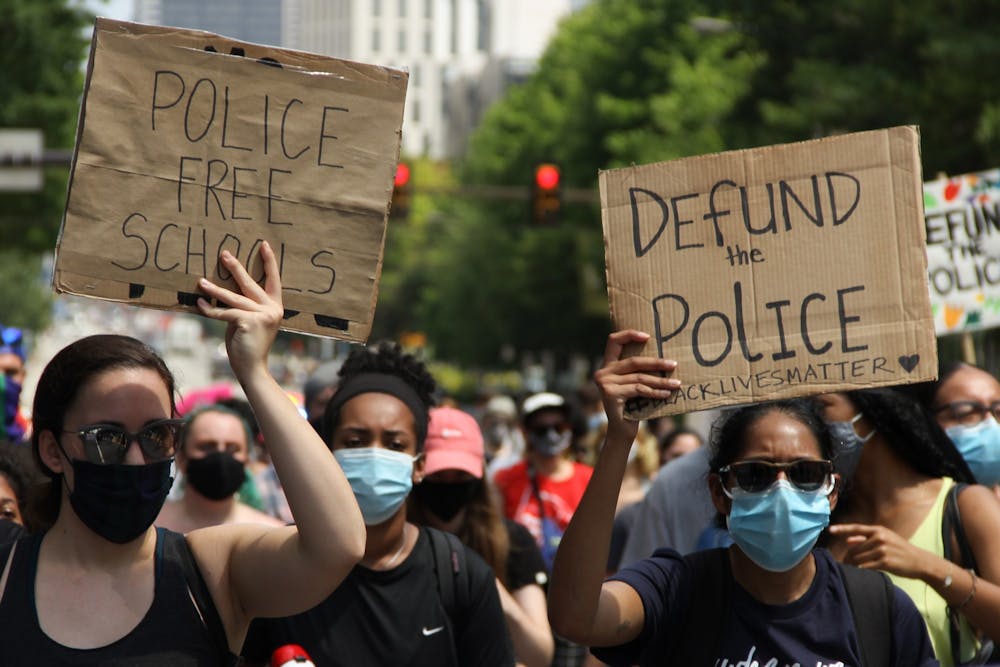
Members of the Penn community held a candlelight vigil on Mar. 17 to honor the victims of the shooting in Atlanta.
Credit: Sukhmani KaurFollowing a mass shooting targeting Asian women in Atlanta-area massage parlors on Tuesday, students are calling for greater recognition and dismantling of anti-Asian racism in society.
Authorities charged 21-year-old Robert Aaron Long with eight counts of murder on Wednesday. Six of the victims were Asian women, according to The New York Times. Long’s attacks have led to a wave of anger and sadness in the Asian American community — including at Penn, where several students and faculty expressed their frustration to The Daily Pennsylvanian.
College first year Michelle An said that she feels this tragedy reflects many of the problematic ideals that western imperialism and anti-Asian racism have created that portray Asians as weak or submissive individuals, or as objects of sexual fetishization.
“There is so much change that needs to happen, and it shouldn’t have taken a violent tragedy to bring attention to these pre-existing issues,” An said.
An added that she feels like she “could go on forever” about the different anti-Asian instances of discrimination and racism that she has faced as a result of her Korean American identity.
“I’ve always been a high-achieving student throughout school, and many times my fellow classmates or even teachers attributed my good grades to my ethnicity rather than my hard work. I was constantly bullied for my physical features that did not conform to Eurocentric beauty standards,” An said. “Classmates would approach me and pull their eyes back with their fingers to mock my eyes while shouting things like 'ching chong' or even pretending to order Chinese takeout.”
College first year Erika Acosta said her initial reaction of sadness and shock turned to rage once she noticed how mainstream media reported on the subject. She said she saw more coverage of a police officer attributing the crime to the murderer having a "bad day" and pointing to sexual frustration as the motive instead of condemnation of his racist actions.
“The targeting of the three Asian-owned and run massage parlors should be evidence enough that this was racially motivated, and it angers me to no end that it isn’t being identified as such. And pinning the cause of the shooting on the murderer's 'sex addiction' doesn't make it any less racist. It makes it all the more so,” Acosta said. “[The murderer] did not go anywhere but three massage parlors filled with Asian women. He certainly made that connection — and it was a sickening one.”
College sophomore Seo Yun Hwang echoed Acosta’s sentiments regarding the prevalence of Asian American microaggressions and discrimination in America, noting that she believes that it is the accumulation of these instances of discrimination that create violence and hate targeted towards Asian American and Pacific Islander communities.

Students protested against anti-Asian violence at the vigil on Mar. 17.
“I can't even begin to tell you how many times people have come up to me and before they even ask for my name, they ask where I’m from, or assume I’m from China. And when I tell them that I'm from Korea, they’ll ask, ‘well, North or South?”’ Hwang said. “Those small comments that you face as an Asian American can really take a toll on you. The individuals that inflict them in the first place are empowered on that platform of hate, and I hate to say it, but that’s what allows for people like this awful monster to do what he did and come out of it alive.”
English professor and Director of the Asian American Studies Program Josephine Park said she was not surprised by the shootings on Tuesday given America’s history of anti-Asian racism.
“This corresponds to a very long history in this country of the way it has treated Asians and Asian American women in particular,” Park said. “This recent rise in nativism, all of this is a direct response to racism at the very highest levels. It's totally shocking. But sadly, it was predictable.”
She added that in her work on Penn’s Task Force on Supporting Asian and Asian American Students and Scholars, which launched last April, she has found that many students either don’t see anti-Asian racism recognized or do not believe it is real. Park said the shootings brought to the forefront just how prevalent anti-Asian racism in America is, but added that "this isn't the price you want to pay to convince people."
College junior Claire Nguyen said she found Penn’s statement in response to the shootings on Wednesday — which denounced violence and discrimination against Asians and Asian Americans — insufficient, particularly its emphasis on the task force.
Nguyen said that because of the significant presence of Penn Police on the task force, they do not believe it can effectively create a safe environment for people of color and working-class people at Penn and in Philadelphia. As of June 2020, three of the 19 members of the task force are from the Division of Public Safety.
“The police do not keep Asian Americans safe,” Nguyen said.
Nguyen added that while she has attended a Task Force session on state violence towards Asians and Asian Americans, they do not believe the Task Force — which holds monthly discussion series and restorative practice circles — is the best way for Penn to support its Asian and Asian American students.
Nguyen called on Penn to take more tangible steps to support its AAPI community — like establishing a house on Locust Walk for the Pan-Asian American Community House, which is located in the basement of the ARCH building. PAACH has called for a house for several years. She added that Penn could also increase support for the Asian American Studies Program, which currently has just three tenured faculty members, including one departing this year.
“If the University is truly committed to being anti-racist, [Penn Police] would be abolished — they would not be chairing this task force,” Nguyen said. “There would be resources on campus for the already existing Asian American organizations.”

Members of the Penn community have pushed the school to defund its police force.
Wharton sophomore and Class Board 2023 President Derek Nhieu said he feels “hesitant” to trust that the University’s statement in response to the shootings will be followed by concrete change.
“From what I’ve seen so far in the University’s handling of social issues, it seems like they like releasing a lot of statements with a lot of words, but there's not always necessarily any sort of concrete action plan to combat the issue at hand,” Nhieu said. “I know that in the email, [the administration] said they put together a task force, but I guess you could say I’m a bit skeptical as to what this task force can possibly achieve.”
Nhieu noted that he hopes that the University will be cognizant of how difficult it can be for AAPI students who have to deal with grieving the loss of the victims on top of the rigors of being a student at Penn.
“I do think that the University has a history of not really supporting their underrepresented groups on campus with adequate resources and funding,” Nhieu said. “I'm sure there are folks, particularly AAPI students, who are going through a lot right now. And so I hope the University will be mindful of that.”
Hwang said that though social media alone cannot end the harmful stereotypes and acts of violence Asians across the country and world are facing, she believes that speaking out on one’s social media platforms to condemn the violence is a helpful first step.
“It shows us that there are these supportive figures outside of our own community [as an AAPI],” Hwang said. “I think not taking that opportunity to proactively speak out can essentially perpetuate white supremacist state institutions. So, if you have the means to speak out, then why not do so?”
The Daily Pennsylvanian is an independent, student-run newspaper. Please consider making a donation to support the coverage that shapes the University. Your generosity ensures a future of strong journalism at Penn.
Donate




